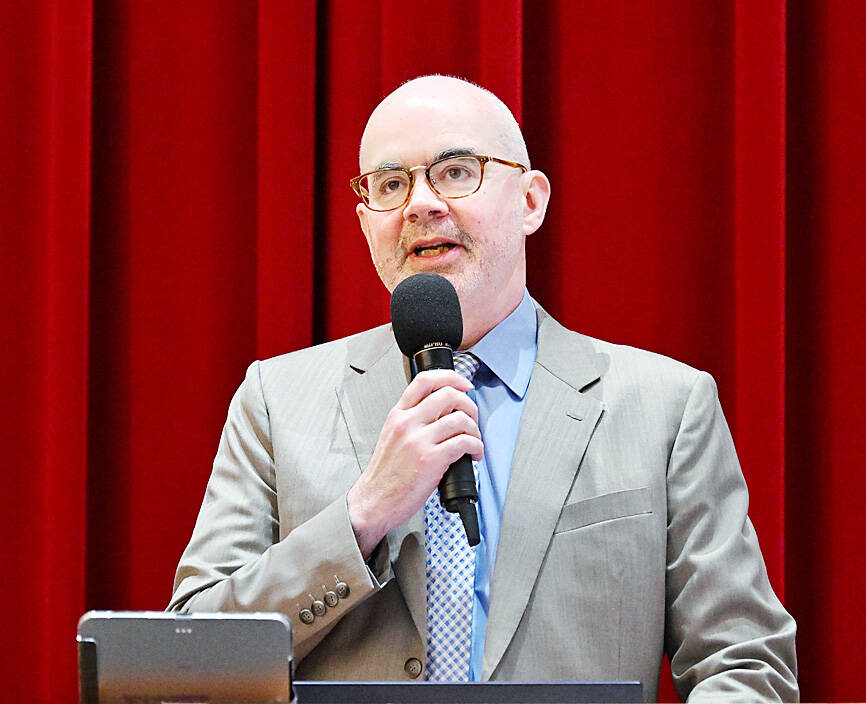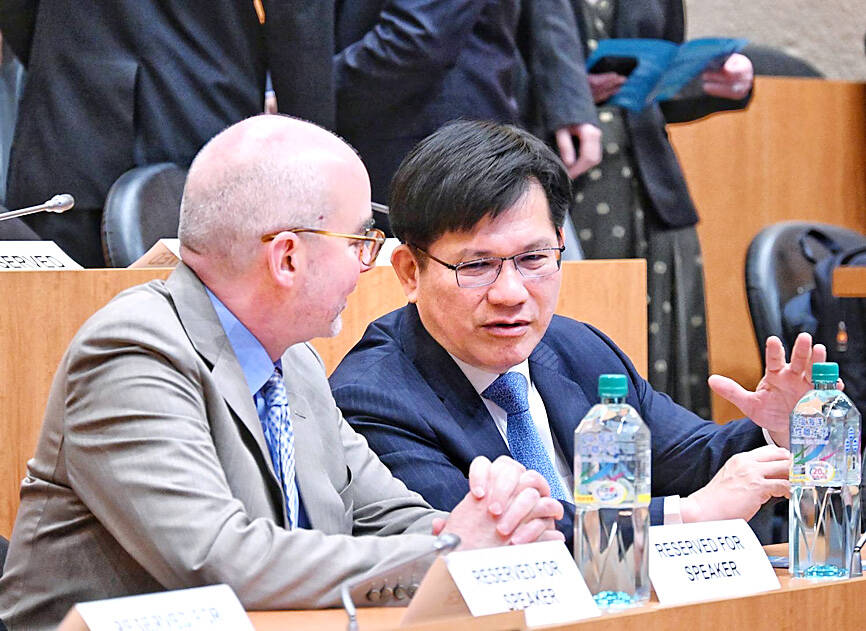American Institute in Taiwan (AIT) Director Raymond Greene yesterday reiterated that the US stands with its allies and partners in the Indo-Pacific region, adding that cooperation is more critical than ever.
Greene made the comments during his congratulatory remarks at the “Taiwan Forward: Driving Modernization Amid Shifting Global Dynamics” conference at National Taiwan University (NTU) in Taipei.
“The United States stands strong with our allies and partners in the Indo-Pacific,” he said. “We’re taking decisive actions to counter threats against economic resilience and advanced shared interests.”

Photo: Fang Pin-chao, Taipei Times
“Our cooperation is more critical than ever,” he said, adding that it makes “the US, Taiwan and all of our regional allies safer, stronger and more prosperous,” referring to remarks by the Minister of Foreign Affairs Lin Chia-lung (林佳龍).
While many countries have recognized Taiwan as a beacon of universal values and support the nation’s resilience and international participation, it has also in the past decade significantly reduced its investments in China, moving them to like-minded democratic countries, Greene said.
However, Taiwan still faces challenges, such as leading in artificial intelligence (AI), but falling behind in software development, which is partially due to reasonable concerns over China’s infiltration of Chinese-language large language models, he said.

Photo: Fang Pin-chao, Taipei Times
Greene also addressed the nation’s security “in the face of a relentlessly aggressive China that is using the full range of military, economic and diplomatic tools against Taiwan.”
“The United States has a stake in these questions and in Taiwan’s success,” he said, adding that the US and Taiwan are leading partners in advanced technology development, while the number of Taiwanese students studying in the US is growing and Taiwan is the US’ seventh-largest trading partner.
“Maintaining the status quo in the Taiwan Strait is critical for the United States and the entire world,” the AIT director said.
Citing comments by US Secretary of State Marco Rubio, Greene said the US has a long-standing position on Taiwan that it would not abandon, which is that “we are against any forced, compelled, coercive change in the status of Taiwan.”
“The challenges Taiwan faces are not only challenges for Taiwan, but for the United States, and the entire world,” he said. “A strong, resilient Taiwan, and a stable and peaceful Indo-Pacific are the foundations of modernization.”
The conference — organized by the Taiwan Program at Stanford University’s Walter H. Shorenstein Asia-Pacific Research Center and cosponsored by NTU’s Office of International Affairs — featured panel discussions with academics from Stanford University, NTU and other universities in Taiwan, Japan, South Korea and Singapore, alongside Taiwanese industry leaders, on topics ranging from AI innovation and semiconductor, entrepreneurship, biomedical and healthcare advancements, and Taiwan’s demographic transformation.
Additional reporting by CNA

Intelligence agents have recorded 510,000 instances of “controversial information” being spread online by the Chinese Communist Party (CCP) so far this year, the National Security Bureau (NSB) said in a report yesterday, as it warned of artificial intelligence (AI) being employed to generate destabilizing misinformation. The bureau submitted a written report to the Legislative Yuan in preparation for National Security Bureau Director-General Tsai Ming-yen’s (蔡明彥) appearance before the Foreign Affairs and National Defense Committee today. The CCP has been using cognitive warfare to divide Taiwanese society by commenting on controversial issues such as Taiwan Semiconductor Manufacturing Co’s (TSMC, 台積電) investments in the

INVESTIGATION: The case is the latest instance of a DPP figure being implicated in an espionage network accused of allegedly leaking information to Chinese intelligence Democratic Progressive Party (DPP) member Ho Jen-chieh (何仁傑) was detained and held incommunicado yesterday on suspicion of spying for China during his tenure as assistant to then-minister of foreign affairs Joseph Wu (吳釗燮). The Taipei District Prosecutors’ Office said Ho was implicated during its investigation into alleged spying activities by former Presidential Office consultant Wu Shang-yu (吳尚雨). Prosecutors said there is reason to believe Ho breached the National Security Act (國家安全法) by leaking classified Ministry of Foreign Affairs information to Chinese intelligence. Following interrogation, prosecutors petitioned the Taipei District Court to detain Ho, citing concerns over potential collusion or tampering of evidence. The

‘COMPREHENSIVE PLAN’: Lin Chia-lung said that the government was ready to talk about a variety of issues, including investment in and purchases from the US The National Stabilization Fund (NSF) yesterday announced that it would step in to staunch stock market losses for the ninth time in the nation’s history. An NSF board meeting, originally scheduled for Monday next week, was moved to yesterday after stocks plummeted in the wake of US President Donald Trump’s announcement of 32 percent tariffs on Taiwan on Wednesday last week. Board members voted to support the stock market with the NT$500 billion (US$15.15 billion) fund, with injections of funds to begin as soon as today. The NSF in 2000 injected NT$120 billion to stabilize stocks, the most ever. The lowest amount it

NEGOTIATIONS: Taiwan has good relations with Washington and the outlook for the negotiations looks promising, Minister of Economic Affairs J.W. Kuo said Taiwan’s GDP growth this year is expected to decrease by 0.43 to 1.61 percentage points due to the effects of US tariffs, National Development Council (NDC) Minister Paul Liu (劉鏡清) said at a meeting of the legislature’s Economics Committee in Taipei yesterday, citing a preliminary estimate by a private research institution. Taiwan’s economy would be significantly affected by the 32 percent “reciprocal” tariffs slapped by the US, which took effect yesterday, Liu said, adding that GDP growth could fall below 3 percent and potentially even dip below 2 percent to 1.53 percent this year. The council has commissioned another institution